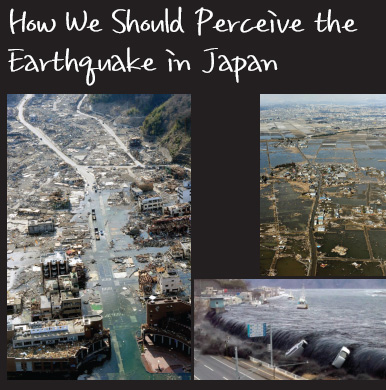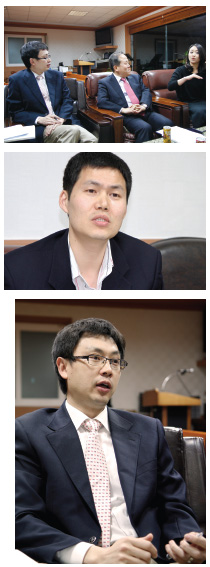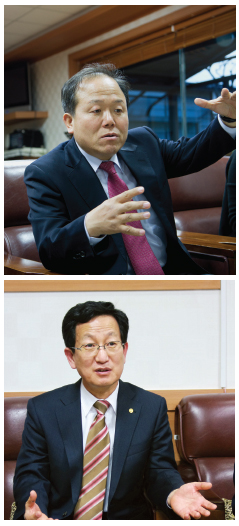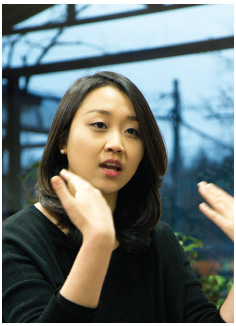|
How We Should Perceive the Earthquake in Japan (2011.4)
|
|
|
글쓴이 :
관리자
|
|

Participants:
Pastor Joseph Cho, Elder Kyeong-chun Yeon, Geun-uk Ji, Irae Kang (born in Japan, currently a student of Theology at Yonsei University) Presenter: Ji-un Lee (Reporter of Politics for Seoul Newspaper, former Beijing Correspondent)
I became known for being the first Korean reporter to arrive at the scene of the Sichuan earthquake in 2008 (I was actually the second, but when I was featured on one of the most influential radio programs, the presenter erroneously announced that I was the first).
On the way to Sichuan, there was a question that was stuck in my head the whole time. It was about the earthquake and the end times. The Bible clearly indicates that earthquakes are eschatological phenomena. In fact, it was stated by Jesus Himself. He said “…and in various places there will be famines and earthquakes” (Matt 24:7). The essence of the question was this: “Many Christians are living as if it is the end times. Are earthquakes frequent today? Scientists say that this is not so. Earthquakes have been occurring everywhere, and when looking back more than 100, or 200 years, the average frequency of earthquakes has not changed significantly.
However, through the Sichuan earthquake, I reached the conclusion that earthquakes had become frequent. I do not mean to say that the number of earthquakes has increased. Through “seeing the earthquake with my own eyes,” I became truly aware of the fact that earthquakes are frequent. In the past, there were also earthquakes, but people were not aware of them. For instance, thirty years ago, it would have been difficult to be aware of disasters in neighboring countries, let alone far-away countries such as Indonesia, Haiti, Chile and New Zealand. Back in 1976, in China, the Tangshan earthquake caused immense calamity, but the Sichuan earthquake was felt by the entire population.
I believe that the human race has never experienced anything like the Japanese earthquake. The true velocity of tsunamis and the extent of how dangerous earthquakes are have became known. The disaster areas, recorded by helicopters and mobile phone cameras, were played back vividly. It is a paradoxical case in which technological advancement has spread awareness of the true terror that nature can bring. Through the recent earthquake, countries as far away as the United States and those in South America felt the tension. What I mean by this is that it is a global horror. With the volcanic eruption in Iceland, the rest of Europe seized up and its degree of influence even reached Korea. Truth be told, earthquakes have become more frequent, magnitude of disasters are becoming greater, and it is a time in which concerns and fears are burgeoning. Because of that reason, this time last year, we decided to open up another round-table discussion on the subject of eschatology again the following year. This year, though the discussion was in conversation-style, it was organized by topic.

Frequent Earthquakes and Disasters
Kyeong-cheon Yeon: Up to this day, we have constantly received reports of disasters in China, Haiti, New Zealand, Chile, but the recent earthquake in Japan was the most astonishing. It was the fact that it had happened to Japan, the country that had boasted about being the ‘safety heaven’ alluding to the construction of its impeccable earthquake resistance system, after the Kobe earthquake in 1995.
Joseph Cho: The presenter mentioned ‘becoming aware through seeing.’ However, there is an ongoing phenomenon in which people are becoming increasingly apathetic and accustomed to tragic situations the more they become frequently informed of disasters. It is the same for ongoing wars and famine. As time passes by, it is easy to forget such incidents. Even though, as global citizens, people should become increasingly tense and reverent with regard to the issues of natural disasters, their memories revert back to the ‘starting point.’ This is due to the foolishness of failing to see the disasters as God’s signals to humans. Although many people perceive disasters as natural phenomena, Christians must not share that sentiment. Natural disasters are signals telling us to keep awake; they are signs. During the time of the flood, people must have believed that the rain would ‘soon stop’ until the moment that they died. The Bible states that “and they did not understand until the flood came and took them all away.” This is because they must have experienced a lot of rain before that point. This may be our current condition today.
Presenter: So you are saying that the people’s reactions, after seeing and becoming aware of the situation, can be categorized as either “alertness” or “impassivity.”
Kyeong-cheon Yeon: Although there are even non-believers who claim that the end of the world is coming, many Christians are not certain of the fact that every incident in world history has been under God’s providence. The human mind is so covered in thorns that they do not accept God’s administration and His mysterious providence. That is made clear in the Redemptive History Series.
Joseph Cho: Through the viewpoint of protestant Christianity, nothing is a coincidence. Interpreting all individual things, in any shape or form, as a sign is a protestant principle. Earthquakes are being perceived through scientific theories, such as those about the Earth’s crust. However, through the protestant faith, these occurrences do not happen by chance. Everything comes to be under God’s sovereignty. Therefore, we should understand that they are God’s signs and signals. God’s signals to the world - Christians must interpret them in this manner.
Eschatology
Geun-uk Ji: Eschatology is one of the tenets of Christianity; however, we are at a point in which it is difficult for the Church to even bring up the subject of the end time. It is largely the fault of negative effects brought about by ‘cyber religions’ and the fear they created regarding the end time. However, even ‘churches do not attempt to teach the right eschatology. Many of the congregation is thirsty for knowledge about biblical eschatology but there are not many places that teach it.
Irae Kang: As there is uncertainty about the Church’s eschatology, anyone who brings up the end times is regarded as a heretic?even when the Bible clearly talks about the end times. That’s why the church itself seems to play a part in exacerbating society’s uneasiness.
Joseph Cho: The biblical end times signify the completion of the history that will be fulfilled at the end. The point of the completion of redemptive history is the end times. Destruction, the end of humanity, and other terrifying factors shouldn’t be so emphasized. In the Christian end, what was once temporary is replaced by eternity, what was once physical is replaced by the spiritual, and death and suffering is replaced by eternal life and happiness. It is a process in which sin and goodness are separated. The destruction of sin and the transformation of goodness coincide. It is an episode of completion. Even so, humans hope for the end times to be delayed because of their sins. I think that, regarding eschatology, *Professor Kyung-bae Min’s review on the first Redemptive History Series book ‘Genesis Genealogies’ has the best explanation. The completion of Redemptive History is to fulfill and bring about God’s kingdom. For the believers, it is hope and for the non-believers, it is fear. That kind of biblical education must be implemented.
*“The author unravels this gradual process… This interpretation allows us to view eschatology as a completion of redemptive history fulfilled in the glorious return of our Lord rather than a fearful judgment that comes abruptly at “the end time.” Blessed with this understanding, one can look forward with thanksgiving and praise to the eschatological grace and blessings that are to come. This message reaffirms a gospel that marks Christianity as the religion of thanksgiving, joy, and bright hope. Simultaneously, it is an indirect exclamation of history on earth that exemplifies God’s history of life and blessings.” Dr. Kyung Bae Min, Th.D. (Honorary Professor of Yonsei University, Former President of Seoul Jangsin University)

The Role of the Church
Presenter: What is the primary reason that the Church cannot address biblical eschatology?
Joseph Cho: Because the Church does not exert steady influence on society, we cannot say what we wish to say. It would result in uproar and conflicts which is why we no longer have the ability to speak. Through materialism, factionalism, and loss of morals, we are falling short of expectations. There was a time when a Japanese journalist proclaimed that ‘although there are more crosses in Korean than Japan, the ethical standard of the Japanese are higher than that of Koreans.
Kyeung-chun Yeon: I remember it being in the mid 1980s. At the time, someone brought in a phonebook and proposed that we bet on whether there are more churches or coffee shops registered in it. After checking the phonebook, the number of churches was twice the number of coffeehouses - more than we had anticipated.
Joseph Cho: We must thoroughly examine our moral standards. There is a moral standard that society expects from the Church. The churches must perform at least 30% higher than this average level in order to be accepted by the society. A sorrowful movement of repentance must be initiated at the Church. We must raise our spiritual standards in order to wake up and become the light and salt of the world.
Geun-uk Ji: I think that the Redemptive History Series is the most concordant with Christian eschatology. It clearly informs us of what the ‘end time’ is through the redemptive historical viewpoint and how we should prepare for it. This is possible because, through the words, it vividly animates thousands of years’ worth of events. When reading the series, it became clear that Enoch was able to walk with God because he accepted the “reality” of the end time prophecy. Perhaps we cannot exactly sense the end time coming because we failed to read about “Noah’s flood” with much feeling.
Joseph Cho: Enoch, too, was a person with the same characteristics as us. Of course, he must have had times of sadness and difficulties. He always kept his sight on the end times and tried to keep his eyes set on God. It was a situation in which God’s presence did not leave him. Enoch’s son Methuselah was a direct revelation. It would have been extremely difficult to ignore and relax because the meaning of his name ‘When he dies, it will come’. It was a strong sign from God. Christians must become the spiritual Methuselahs of this world.
Kyeong-cheon Yeon: Presuming that “Asset=Debt+Capital”, if “Capital=Faith” then Debt=Debt to God. I think that if we assiduously pay back our debts, not only will we become like Enoch but it will also be good for the soundness of our assets.
Punishment “The Church will be judged first”
Topic: The controversial claim that “God punished Japan”
Irae Kang: Every time I hear someone say that ‘this happened to Japan because there are few Christians there”, I get upset. There is not an area in Japan in which no Christians exist. It is only the fact that the percentage is rather small.
Kyeun-uk Ji: There probably was a context in which they brought up the issue about their social problems. It was explained partially later. Either way, it is not the time to provoke the world but a time in which serious consideration regarding how to approach the situation must be taken.
Irae Kang: Of course, in Japan, it is not easy to tell people that you are a Christian. Ijimae (exclusion) of Christians still remains to this day. I was subject to ijimae because I am the daughter of a pastor. A Japanese theologist once said that “Although Japan is collapsing, the work for Christians is increasing.” This could be interpreted as a call for Christians to think about how Japan could be transformed through the Word.
Joseph Cho: If there is no repentance in the Church, the Church will be judged first. This, too, is biblical. The Bible shows that judgment will start “within the temple.” Didn’t Southern Judah, remaining as God’s province, eventually become subject to judgment as well?
Kyung-chun Yeon: I remember that in Luke 13:4-5, Jesus said, “Or do you suppose that those eighteen on whom the tower in Siloam fell and killed them were worse culprits than all the men who live in Jerusalem? I tell you, no, but unless you repent, you will all likewise perish.”
Presenter: “Who was punished despite being sinless?” It seems that this issue can also flow that way.
Joseph Cho: In the Bible, a ‘curse’ turns into a chance for ‘grace and repentance’, time and time again. Hezekiah, who was given an extension of life from the curse of death, is a primary example of this. Manesseh, too. I believe that eschatological education should be the work of letting the truth be taken as the truth.

Japan and its recent earthquake
Irae Kang: When first hearing about the earthquake, some of my Japanese friends just accepted it, saying that *“what was coming has finally come.” For a long time, there had been talks of a large-scale earthquake in Tokyo.
*The earthquake that took place on March 11th was beyond the government’s control on every level. Considering the Japanese government’s measures on preparation for earthquakes, the area most likely to break out in an earthquake is the Tokai(Tokyo~Shizuoka~Aichi) district. However, in reality, the area that was affected most severely was Tohoku. Whilst preparing for Tohoku earthquake, the government had announced the scale to be 5 the scale of the recent earthquake was 8. There was a large amount of casualties. The predicted number of deaths by the “Tohoku Earthquake Measures Investigation Agency” in 2003 was at most 10,000. After the recent earthquake, the number of deaths and those who are missing has already exceeded 25,000. (The Chosun Ilbo, March 26th, Page C1)
Geun-uk Ji: Was it a form of superstition?
Irae Kang: No. Its predictions were based on scientific proof so people were expecting it. In Japan, you learn about earthquakes extensively in physics class. In Japan, earthquakes are so common that tremor levels of about five are not considered threatening at all. The people are so accustomed to them that they only feel disturbance when the tremor level reaches above 6 or 7. When you place your furniture in a new home, the first thing you consider is the possibility of an earthquake. I was born in Japan and moved around several places including Hokkaido, Osaka, and Tokyo and when I was in Hokkaido, an earthquake took place. The dishes shattered and the water in our fish tank poured out. Everything capable of falling fell to the ground. But everyone went to school. Lunch couldn’t be prepared so we were given milk and bananas and were sent home after morning classes. When I recently talked to my friends, there was a consensual sentiment that “preparation for natural disasters is not enough.” They’d had initial fear about an earthquake in Tokyo but the fact that such calamity took place in an area beyond anticipation of disaster was all the more upsetting.
Geun-uk Ji: Do you think that many natural disasters will motivate people to search for an ‘absolute god’?
Irae Kang: After the Kobe Earthquake in 1995, there was a person who asked that question to a Japanese Christian. Why people do not come to believe when it seems that they’d be searching for an absolute god after such experiences. The answer was that ‘that is why they do not believe’. They believe that if God exists, such incidents would not occur. I think that, on one hand, even pluralist values come into play. People turn to *Sinsa at birth, go to church at Christmas, and on New Year’s Eve, they go to Buddhist temples. They have the sort of culture in which they get married in church and buried at Buddhist temples. Also, there are many things that Christianity tells you not to do, but Buddhism is relatively lesser in such restrictions so I think that is one of the factors why.
*Sinsa : Shrines in Japan where the descendants of the royal family, traditional gods, and also nationally distinguished figures are worshipped.
Joseph Cho: Historians see the Battle of Carchemish, involving Assyria, Egypt and New Babylon, as having reorganized Middle Eastern powers.
It is understood that the Battle of Gaugamela switched around Hellenistic/Greek and Persian leadership. However, when we look at world history through the redemptive historical viewpoint, don’t we come to realize that these incidents happened so that the redemptive history continues through God’s chosen people after he disciplined Israel? The fact that all things come to be through God can be confirmed through reading the fifth book of the Redemptive History Series, “The Promise of the Eternal Covenant in the Profound Providence of God.”
Irae Kang: I think that through the recent earthquake, the word will spread further in Japan.

The Aftermath of the Japanese Earthquake
Presenter: Through this incident, doubts towards using nuclear power are spreading rapidly. It has come to a point where countries are considering rectification of their policies. It is not an overstatement to say that the modernization that caused the affluence of today brought energy through electric power. There are claims that giving up nuclear power, without having secured alternative energy, or dramatically lowering its use equates to giving up on ‘progress’ and ‘development.’ On one hand, it is pointed out that “the belief that people can manage the high-to-low level nuclear wastes for years and years to come is human arrogance.” Humans have enjoyed the abundance period of modernity without any measures. I see this issue being debated heatedly in the future.
Joseph Cho: The evolution of civilization and culture are not to blame. Affluent lifestyles and happiness are not to blame either. Only the wants and selfishness deriving from affluence are the factors that should be cleansed. The contemporary society should handle problems concerning atomic power with the wisdom that is given by God. Because the user’s methods are evil, it is a problem. The Tower of Babel resulted from humanistic thought. It was initiated by people who wanted to ‘make a name for themselves.’
Geun-uk Ji: Although civilizations developed, in contrast, faith got weaker and therefore men fell into sin. I feel that the restoration of faith
Joseph Cho: Although civilization and culture developed immensely since the time of creation to our contemporary world today, if there is anything that does not change, it is the human mind. We can definitely say that sin and temptation has become even greater. Without resolving the tower of sin within the mind, what has been stacked up can only be subject to crumbling through discipline. The exemplar of such an incident is the Tower of Babel.
|
|

